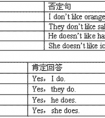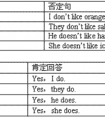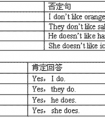改错。( ) 1. Icanplaysthepiano. ______________ A B C ( ) 2. Jennyplaystheerhuthreetimeaweek. ______________ A B C ( ) 3. Danny isabadpianoplay. ___________-六年级英语
题文
| 改错。 |
| ( ) 1. I can plays the piano. ______________ A B C ( ) 2. Jenny plays the erhu three time a week. ______________ A B C ( ) 3. Danny is a bad piano play. ______________ A B C ( ) 4. Let I think. ______________ A B C |
答案
| 1. B-play 2. C-times 3. C-player 4. B-me |
据专家权威分析,试题“改错。( ) 1. Icanplaysthepiano. ______________ A B C ( ) 2..”主要考查你对 情态动词,复数名词,名词,人称代词 等考点的理解。关于这些考点的“档案”如下:
情态动词复数名词名词人称代词
考点名称:情态动词
情态动词:
是一种本身有一定的词义,但要与动词原形及其被动语态一起使用,给谓语动词增添情态色彩,表示说话人对有关行为或事物的态度和看法,认为其可能、应该或必要等。
情态动词后面加动词原形。情态动词词义不完全,不能单独作谓语,只能与动词原形一起构成谓语。
情态动词有四类:
①只做情态动词:must,can(could),may(might)……
②可做情态动词又可做实义动词:need,will
③具有情态动词特征:have(had,has) to,used to,ought to
④情态动词表猜测:一肯一否三不定(must一肯,can not一否,may,might,could,三不定。)
注:mustn't代表强烈禁止 must表示主观,have to表示客观。
常用的有:can may could must have use .(can,may,must,should,need)
例:Kate can swim. 凯特会游泳。
May I borrow your dictionary, Ann? 安,我可以借用你的字典吗?
Shall we meet at seven o’clock tomorrow? 我们明天七点见面怎么样?- 情态动词的语法特征:
①情态动词不能表示正在发生或已经发生的事情,只表示期待或估计某事的发生。
②情态动词除ought 和have 外,后面只能接不带to 的不定式。
③情态动词没有人称,数的变化,即情态动词第三人称单数不加-s。
④情态动词没有非谓语形式,即没有不定式,分词,等形式。
情态动词两要点;动词原形跟后面,说话语气较委婉,can表"能力"may"许可",must"责任"或"义务",否定回答"needn't"换;should"应该",would"愿",have to "被迫"表客观.
注释:对must构成的一般疑问句作否定回答只能用needn't. 比较can 和be able to:
1.can/could 表示能力;可能 (过去时用could), 只用于现在式和过去式(could)。
be able to可以用于各种时态。例如:
They will be able to tell you the news soon. 他很快就能告诉你消息了。
2.只用be able to的情况:
a.位于助动词后。
b.情态动词后。
c.表示过去某时刻动作时。
d.用于句首表示条件。
e.表示成功地做了某事时,用was/were able to,不能用could。例如:
He was able to flee Europe before the war broke out.= He managed to flee Europe before the war broke out.
他在战争爆发之前逃离欧洲。
注意:could有时不表示时态
1.提出委婉的请求,(注意在回答中不可用could)。例如:
Could I have the television on? 我能看电视吗?
Yes, you can. / No, you can't. 可以/不可以。
2.在否定句、疑问句中表示推测或怀疑。例如:
He couldn't be a bad man. 他不大可能是坏人。比较may和might:
1.表示允许或请求;表示没有把握的推测;may 放在句首,表示祝愿。例如:
May God bless you! 愿上帝保佑你!
He might be at home. 他可能在家。
注意:might 表示推测时,不表示时态,只是可能性比may 小。
2.成语:may/might as well,后面接不带to 的不定式,意为"不妨"。例如:
If that is the case, we may as well try.如果情况确实如此,我们不妨试一试。比较have to和must:
1.两词都是“必须”的意思,have to 表示客观的需要,must 表示说话人主观上的看法,既主观上的必要。例如:
My brother was very ill, so I had to call the doctor in the middle of the night.
弟弟病得很厉害,我只得半夜里把医生请来。(客观上需要做这件事)
He said that they must work hard.
他说他们必须努力工作。(主观上要做这件事)
2.have to有人称、数、时态的变化,而must只有一种形式。但must 可用于间接引语中表示过去的必要或义务。例如:
He had to look after his sister yesterday. 他昨晚只得照顾他姐姐。
3.否定结构中:don't have to表示"不必",mustn't表示"禁止"。例如:
You don't have to tell him about it.你不一定要把此事告诉他。
You mustn't tell him about it.你不得把这件事告诉他。比较shall和should:
1).shall 用于第一人称,征求对方的意见。
What shall we do this evening?
2).shall 用于第二、三人称,表示说话人给对方的命令、警告、允诺或威胁。
①. You shall fail if you don’t work hard.(警告)
②. He shall have the book when I finish it.(允诺)
③. He shall be punished.(威胁)will和would的用法:
1.表示请求、建议等,would比will委婉客气。如:
Would you pass me the book?
2.表示意志、愿望和决心。如:
I will never do that again.
They asked if we would do that again.
3.用“will be”和“will(would) + have + 过去分词”的结构表示推测,主要用于第二、三人称。
前者表示对目前情况的推测,后者表示对已经完成的动作或事态的推测。如:
This will be the book you want.
- 最新内容
- 相关内容
- 网友推荐
- 图文推荐
| [家长教育] 孩子为什么会和父母感情疏离? (2019-07-14) |
| [教师分享] 给远方姐姐的一封信 (2018-11-07) |
| [教师分享] 伸缩门 (2018-11-07) |
| [教师分享] 回家乡 (2018-11-07) |
| [教师分享] 是风味也是人间 (2018-11-07) |
| [教师分享] 一句格言的启示 (2018-11-07) |
| [教师分享] 无规矩不成方圆 (2018-11-07) |
| [教师分享] 第十届全国教育名家论坛有感(二) (2018-11-07) |
| [教师分享] 贪玩的小狗 (2018-11-07) |
| [教师分享] 未命名文章 (2018-11-07) |



![—Can you swim?—Yes ,________[ ] A. I can'tB. I canC. I am-三年级英语](http://www.00-edu.com/d/file/ks/4/1/46/2019-08-24/smallae208768e77b392cb00a5a8a687f84961566582505.jpg)
![_____________ I see that toy panda? [ ]A. canB. mayC. May-五年级英语](http://www.00-edu.com/d/file/ks/4/1/46/2019-08-24/small440f55b4860d5c9b87889948786e71451566582371.jpg)

